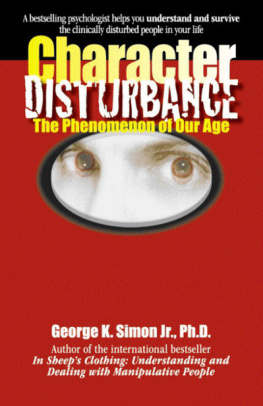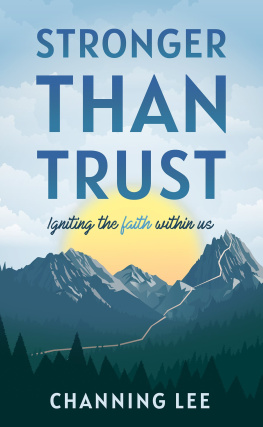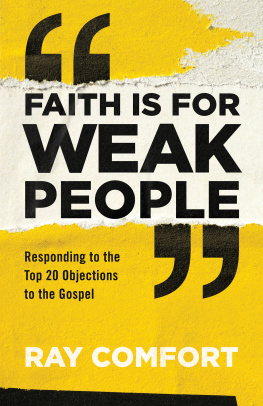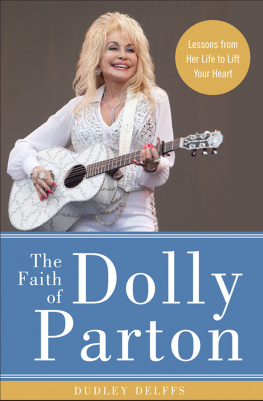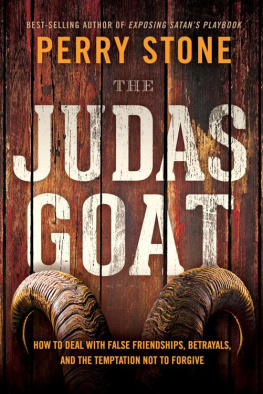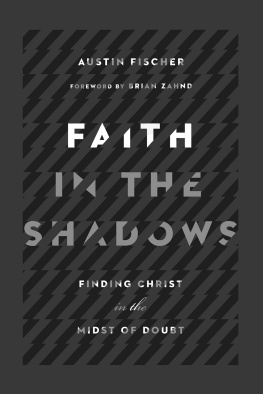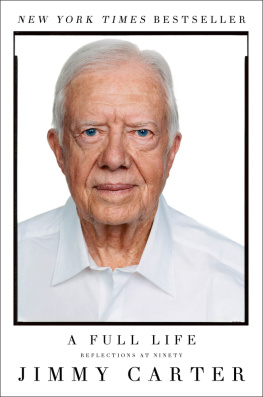THE JUDAS
SYNDROME

Why Good People Do Awful Things
GEORGE K. SIMON JR., PH. D.

THE JUDAS SYNDROME
WHY GOOD PEOPLE DO AWFUL THINGS
Copyright 2013 by Abingdon Press
All rights reserved.
No part of this work may be reproduced or transmitted in any form or by any means, electronic or mechanical, including photocopying and recording, or by any information storage or retrieval system, except as may be expressly permitted by the 1976 Copyright Act or in writing from the publisher. Requests for permission can be addressed to Permissions, The United Methodist Publishing House, P.O. Box 801, 201 Eighth Avenue South, Nashville, TN 37202-0801, or e-mailed to .
The vignettes in this book are for illustration only.
Any similarity to real persons or actual events is purely coincidental.
This book is printed on acid-free paper.
Library of Congress Cataloging-in-Publication Data has been requested.
ISBN 978-1-4267-5109-7
Scripture quotations are taken from the New Revised Standard Version of the Bible, copyright 1989, Division of Christian Education of the National Council of the Churches of Christ in the United States of America. Used by permission. All rights reserved.
13 14 15 16 17 18 19 20 21 2210 9 8 7 6 5 4 3 2 1
MANUFACTURED IN THE UNITED STATES OF AMERICA
CONTENTS

ACKNOWLEDGMENTS

I owe a supreme debt of gratitude to my editor, Kathy Armistead, for providing me the opportunity to write the kind of book Ive long wanted to write and for making the suggestions necessary to make the manuscript more readable.
There is no way to adequately convey the debt I owe my wife, Sherry. I cherish her as my toughest critic as well as my strongest and most unwavering source of support. But even more than that, the level of her commitment to our marriage as a vehicle to grow not only in the love for each other but also in the love of our God has been for me both awe-inspiring and humbling.
I thank God daily for the family I always dreamed of having but once feared was impossible to secure. My sons, daughter-in-law, and grandchildren are but a few of the countless blessings I enjoy but know sincerely I have never merited.
Last, I am grateful for the opportunity to have worked with so many individuals over the years who taught me so much, enriched my life, and helped me appreciate the power of honesty and faith. It is to all of them that I dedicate this book.
INTRODUCTION

Judas betrayed with a kiss. Even people who we think are our friends can disavow and betray us. Are they simply bad people or are they basically decent folks whose weakness of faith and deficiencies of character became exposed when put to the test? If the latter is true, theres a little Judas in all of us.
One of the most sobering and unavoidable realities of life is that bad things sometimes happen. Because we are naturally troubled by such circumstances, religious sages and other observers of the human condition have struggled over the years to explain why these painful events occur in our lives. Some psychologists tell us that darkness lurks deep within each of us, but they cannot fully explain why some people prefer the dark and resist the light.
Consider the Milgram experiment. Imagine you are participating in a study. Like all the participants, you freely signed up. After you listen to the thorough instructions, the leader pairs you up with another participant. He then asks you to give your partner what you believe to be an increasingly high-voltage shock from a generator if he or she fails to answer correctly. Would you be one of the sixty-five percent who followed instructions and gave his or her partner an almost fatal dose of electricity for failing to respond as directed?
Or consider the well-known bystander effect. A young woman is assaulted on a pool table while a crowd of onlookers do nothing. Despite the fact that there is ample opportunity, no one calls for help or intervenes. In fact, according to psychological research, the greater number of bystanders, the less likely it is that any of them will help.
Yes, bad things happen, and often good people are the cause.
It used to be, in ancient times, that people believed bad thingsincluding natural disasters such as earthquakes and volcanic eruptionshappened because various gods were not sufficiently appeased by the sacrifices that people offered them. And even during the time of Jesus, many Jews believed that people suffered misfortune of all sorts, including physical illnesses, because they or someone in their families had incurred the wrath of God. Those who prospered, they reasoned, must be living righteously, meriting Gods favor, whereas those who were suffering must be impure and only experiencing the just deserts of their impiety. But no matter the time or place, human beings are innately driven to seek meaning and understanding, especially when things dont go their way. And because suffering is such a significant yet undesirable part of our lives, we continually try to come up with acceptable explanations for why bad things happen to us.
This book is not intended to be a comprehensive look at human suffering or an exploration of all the possible reasons bad things happen. Bad things occur for lots of reasons, sometimes perhaps because God permits them. The world in which we live is a wondrous product of creation. But it is definitely not heaven, and we are less than perfect. Our world and our lives are prone to unpredictable and sometimes unpreventable calamities. And contrary to what many believe, many things occur purely coincidentally or accidentally. They are no ones fault. Experiencing both the good and the bad just seems to be part of living in this world. But the inevitability of having bad things happen, or even good people doing bad things, does not mean that we are left helpless with no recourse.
This book is about common and preventable ways bad things happen in our lives and the role that faithmore specifically, genuine faith in Christcan play in avoiding them or dealing with the pain that happens as a result. What is really important to know is that because much of what we suffer stems from our own shortcomings, missteps, and character deficiencies, placing our trust in Christ and his message of love, righteousness, forgiveness, and especially spiritual rebirth, provides the gateway to a rich, abundant, and joyful lifethe life that God intends for us. And although this book is written primarily for a Christian audience, I hope that the major issues it addresses resonate for followers of any belief system, especially those who have taken to heart their faith communitys most tested, validated, and enduring tenets for living a fulfilled, responsible, and principle-driven life.
Suffering of one type or another seems an all too familiar aspect of life. In this imperfect world, we simply cant avoid pain and anguish. And suffering can serve a truly redemptive role in the purification of our souls. Still, it takes considerable faith to find the value in it, especially when, from our perspective, it appears senseless or needless. The larger problem for us and the subject of this book is the suffering that results when people make unloving choices.


